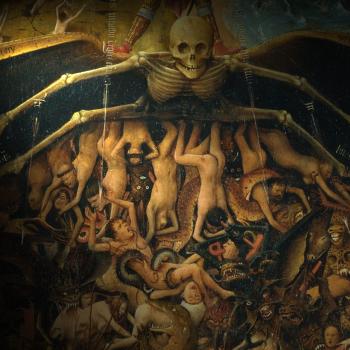Lectionary Reflections
Ezekiel 37:1-14
May 17, 2015
The Day of Pentecost
It is with an audible sigh of relief that I see the Hebrew Bible appearing again in the sights of the lectionary. Of course, that is not quite true, since we have read some Psalms over the past weeks, and they are clearly songs of the Hebrew Bible. But now we return to two weeks of prophetic texts, followed by twelve glorious weeks among the brilliant stories of 1 and 2 Samuel. It is enough to make a lover of the First Testament fairly salivate in anticipation!
But first things first. We come again today to the surprise and joy of Pentecost, at last concluding the fifty days of Easter with a burst of excitement, celebrating what has been called the "birthday of the church." That is, I suppose, not strictly true; it could be argued that the church's natal day was the creation of Israel when God chose a people to "bless the nations" through the fallible human, Abram. I would be one to say that Abram/Abraham is the church's first father and Sarah its mother, and the Christian communities of the first century Mediterranean are the direct heirs of YHWH's promise to that couple. Still, I understand that Peter's sermon, written in Acts 2, inaugurates in fact the huge growth of the early church that culminates in our celebrations on this day.
I readily admit to being a good deal troubled by that sermon. It is deeply anti-Semitic, as verses 23 and 36 make all too painfully plain. Peter excoriates his listeners, calling them murderers in no uncertain terms. The fact that some three thousand are persuaded by this argument, having been "cut to the heart," does not lessen the harsh cruelty of Peter's words. I fear that too many sermons that have been preached since Peter's have all too often used its harshness as a model, assaulting would-be followers of the loving Jesus rather than luring them to emulate that love. I hope that those of you who use that famous sermon today as a part of your own sermon will note the dangers as you do.
I choose rather in this article to look again at the wonderful Ezekiel 37 story to focus our attention on the mystery and majesty of YHWH who knows no death that cannot be infused with life. Whatever this day means, it surely celebrates that fact; the church is in the business of offering life in the midst of a death-dealing culture. And that culture, both that of Ezekiel's 6th-century world and our own, has never better been characterized than in this astonishing and well-known passage. For we, like they, are dry bones, once marrow-filled skeletons, created by God, now picked clean by a culture intent on death for many rather than life for all.
The text is both historical and allegorical at the same time. Ezekiel, it is assumed, went into a Babylonian exile with the first wave of deportees in 597 B.C.E., a group that was added to when Nebuchadnezzar ten years later destroyed what remained of Jerusalem in a furious rage, capturing and blinding the king, Zedekiah, and herding the last leaders of a shattered Judah eastward to the huge Babylonian capital. So, when Ezekiel speaks of dry bones in a valley, he means precisely that — dead soldiers after a slaughter, empty lives after a crashing defeat. When YHWH drops him into this silent and terrifying valley of bones, obviously dead and gone, and asks him, "Can these bones live?" the certain answer must be: "Not a chance!" Yet, Ezekiel does not answer in that way. He says instead, "O YHWH God, you know," a delightfully ambiguous response that could mean "it is your call, not mine," or "you know better than I that dry bones mean nothing less than eternal death."
God makes no appraisal of Ezekiel's hedged reply, but instead in typical divine fashion calls the prophet to his work. "Prophesy to the bones, and say to them, 'Thus says YHWH!'" The prophet is then admonished to proclaim an anatomy lesson to the bones, wherein YHWH will provide breath and sinews and flesh and skin such that the bones will leap to life again, until the valley is filled with a standing host, a "vast multitude" of living beings (Ezek. 37:10). In short, Israel's exile to Babylon is far from the last work of YHWH; the dry bones of defeat and humiliation will become the healthy host of Israel once again. There will be a future and a hope for the scattered people; dry bones will indeed live again.
Older commentators seized on this passage as a presentiment of the much later belief in the resurrection of the dead, but this idea is hardly in the mind of 6th-century Ezekiel. That is made quite clear in verses 11-14. Here begins the allegory of the dry bones. Those bones are "the whole house of Israel," whose whining in Babylon about a loss of all hope among the foreign pagans, is confronted by the power of YHWH and YHWH's prophet who announces that the graves of exile will open and the renewed people will return to the land of Israel. "I will put my spirit within you and you will live," promises YHWH.




